Most of us have one or more credit cards, and if used properly, can be a very helpful tool. Making payments on time every month can boost your credit score and some cards may offer rewards and potentially even 0% interest for balance transfers from other cards for a limited period.
However, if spending on credit cards gets out of control, making monthly payments becomes harder, particularly as the interest element grows.
Currently, we are living in particularly difficult times with cost of living increases cutting into family budgets. The increasing need to make use of every way to make our money go further means that it may be tempting to favour putting purchases on a credit card.
However, falling behind on your payments could lead to potential issues with your credit in future.
We’ve put together some helpful tips that could help you when considering to use a credit card.
1. Pay off your balance every month.
You could avoid paying interest on your credit card purchases by paying the full balance every month.Resist the temptation to spend more than you can pay for any given month, and you could enjoy the benefits of using a credit card without interest charges.
2. Use the card for needs, not wants.
A credit card should be used carefully but if used as a substitute for the family budget, it can very quickly lead to problems with debt. Credit cards can be used in emergency situations, such as a mobile phone bill that’s due before your next payday. It could be an option to use a credit card in this situation, and then pay back the amount as soon as you can to decrease or help to avoid interest charges altogether.
3. Never skip a payment.
Keep up with your payments every month, and aim to repay as much as you can. Missing a payment could result to extra fees, penalty interest rates and/or potentially damage your credit rating, which may make it difficult to get credit in the future.1
4. Use the credit card as a budgeting tool.
Having said all that, if you are careful with how you use your credit card, you could use it responsibly by paying the balance every month. By making purchases with your credit card, you can see exactly how much you’ve spent at the end of the month. Of course, you should only do this if you know you can pay off the balance each month, and it would be worth noting that you should not charge more to your card than you have in your bank account. It can be difficult to manage your monthly payments, so if you find that you are struggling to pay your credit card, there are free online resources available to help, for example Citizens Advice, Step Change, and Money Helper to name a few.
5. Use a rewards card.
If you’re using a credit card for most or all of your purchases, it could help to use a card that offers cashback. According to Money Helper, “Cashback credit cards offer you the chance to earn cash from the money you spend, by paying you back a percentage of what you spend or giving you reward points. They only make sense if you pay off the balance in full each month and never go over your limit. Otherwise, the interest you pay will outweigh the rewards. ”2
It could be a good way to use a credit card, but there are factors that need to be taken into consideration before you decide to proceed. Researching your options first and using government sites such as Money Helper, could help you when making your decision.
Sources
- Moneyhelper (2022) Paying off your Credit Card. Available at: https://www.moneyhelper.org.uk/en/everyday-money/types-of-credit/paying-off-your-credit-card (Accessed 21 Nov 2022)
- Moneyhelper (2022) Cashback credit cards. Available at: https://www.moneyhelper.org.uk/en/everyday-money/types-of-credit/cashback-credit-cards (Accessed 21 Nov 2022)
All the information in this article is correct as of the publish date 24th November 2022. The opinions expressed in this publication are those of the authors. The information provided in this article, including text, graphics and images does not, and is not intended to, substitute advice; instead, all information, content and materials available in this article are for general informational purposes only. Information in this article may not constitute the most up-to-date legal or other information.





